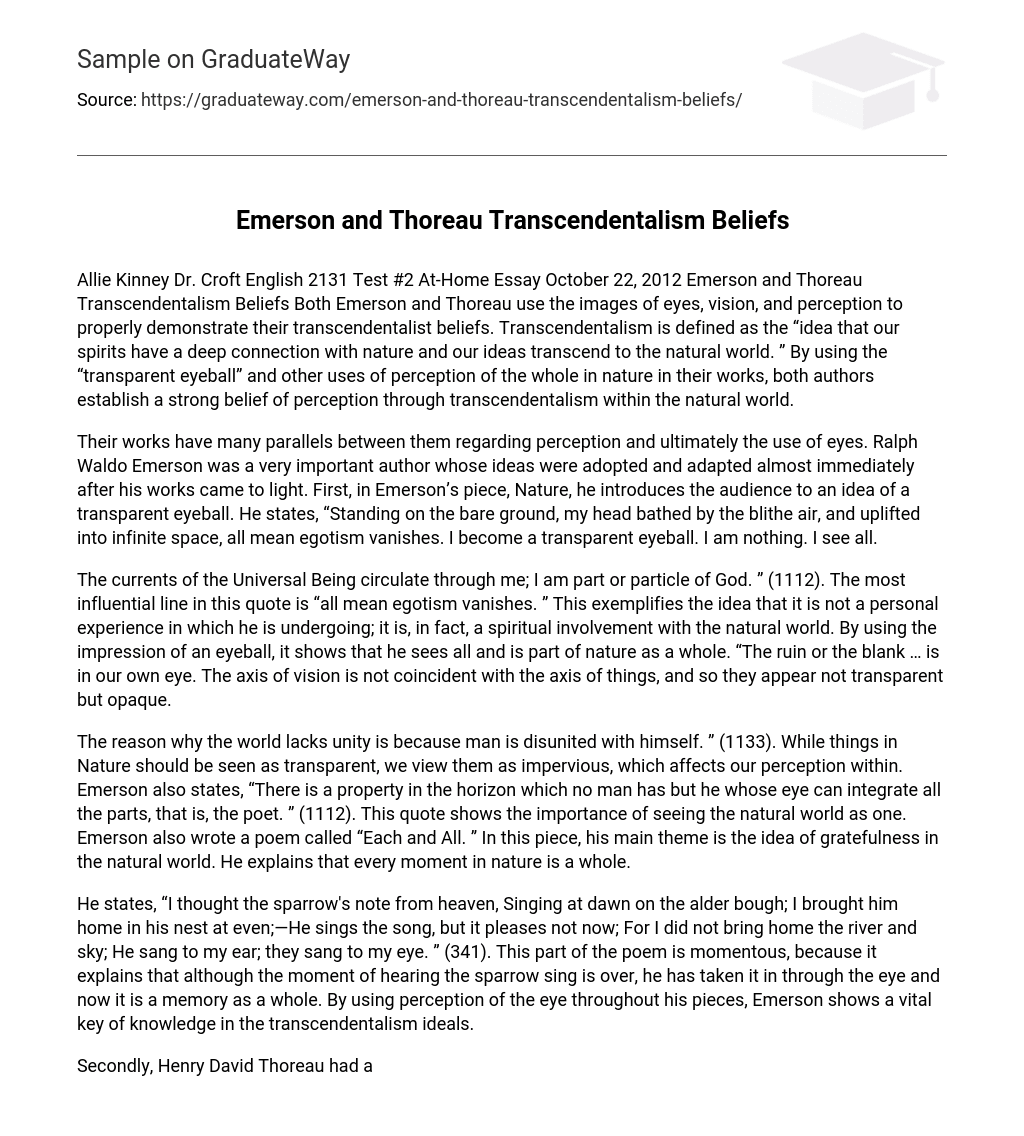Emerson and Thoreau both employ imagery of eyes, vision, and perception to effectively convey their transcendentalist convictions. Transcendentalism is characterized as the notion that our spirits are intimately linked with nature and our ideas surpass the physical realm. Through the utilization of the concept of the “transparent eyeball” and other instances of perceiving the entirety of nature in their writings, these authors establish a firm conviction in perceiving transcendentalism within the natural world.
Their works have numerous similarities in terms of perception and the use of eyes. Ralph Waldo Emerson, a significant author, had his ideas promptly embraced and modified upon the publication of his works. In his piece “Nature,” Emerson introduces the concept of a transparent eyeball to the audience. He describes, “Standing on the bare ground, my head bathed by the blithe air, and uplifted into infinite space, all mean egotism vanishes. I become a transparent eyeball. I am nothing. I see all.”
The quote emphasizes that the currents of the Universal Being flow through the speaker, making them a part of God. The line that stands out the most is “all mean egotism vanishes,” which suggests that the speaker’s experience is not personal but rather a spiritual connection with the natural world. Symbolized by an eyeball, the speaker perceives all and is integrated into nature as a whole. “The ruin or the blank… is in our own eye” conveys that the way we perceive things is subjective and not aligned with their true nature, resulting in opacity instead of transparency.
The lack of unity in the world is attributed to man’s lack of unity within himself, according to Emerson (1133). Instead of perceiving things in nature as transparent, we perceive them as impenetrable, which affects our perception. Emerson also emphasizes the significance of viewing the natural world as a unified whole, stating that only the poet possesses the ability to integrate all its parts (1112). In his poem “Each and All,” Emerson explores the theme of gratefulness in nature, asserting that every moment in nature represents a complete entity.
In this section of the poem, the speaker describes bringing a sparrow home in its nest after hearing its heavenly song on a morning branch. However, now the sparrow’s song no longer brings pleasure, as it was the combination of the bird’s melody with the sight of the river and sky that made it so special. This passage is significant because it conveys the idea that even though the moment has passed, the speaker retains the memory of it through visual perception. By consistently emphasizing the role of sight in his works, Emerson highlights the importance of visual knowledge in transcendentalist beliefs.
Secondly, the transcendentalist belief was greatly influenced by Henry David Thoreau’s work Walden. During his two-year stay at Walden Pond, Thoreau built his house and wrote a narrative that reflected his self-discovery and understanding of nature. The pond itself was remarkable, measuring approximately 104 feet deep and possessing a blue-green hue. Its remarkable clarity made it resemble the iris of an eyeball. Thoreau consistently employed the pond as a metaphor to represent his relationship with nature throughout his work.
Thoreau explores various themes – economic, political, environmental, individualistic, and transcendental – to depict his understanding of nature. As he observes his surroundings, he embodies the concept of becoming a “transparent eyeball.” Emerson’s influence on Thoreau is profound, and the idea of the “transparent eyeball” greatly impacts him. Thoreau repeatedly reflects on his individualistic inclinations during his time at Walden Pond, underscoring his transformation into a “transparent eyeball.” In his own words, he expresses his desire to live deeply and fully experience life.
By drawing a parallel between his own life and the profound depth of Walden Pond, the author highlights the profound role of perception in nature. This point is further reinforced by the structure of Walden, as the author navigates through each season and reflects on the completion of tasks and his perception of them. In the context of transcendentalism, the significance of vision and perception cannot be overstated, as they provide a tangible understanding of what truly holds value in life.
Becoming unified with nature is a crucial aspect of transcendentalism, and authors such as Ralph Waldo Emerson and Henry David Thoreau emphasized this metaphor. Their transcendentalist ideas greatly influenced other authors. By using the example of an eyeball and perception to elucidate the philosophy of transcendentalism, the deeper meaning becomes simplified and allows readers to comprehend more effectively.





